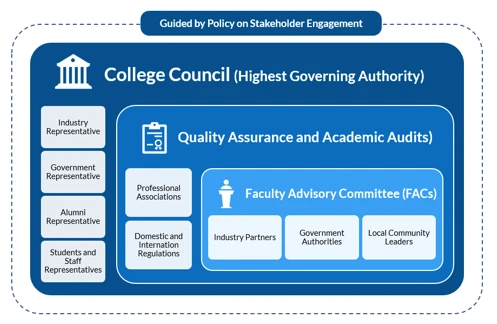Formal Mechanisms
Formal Mechanisms for Stakeholder Participation:
ÃÜÌÒÊÓƵ ensures that local stakeholders have a meaningful, formal mechanism for participating in university decision-making through its highest governing and advisory structures:
The College Council, which functions as the highest governing authority, serves as the strategic body at the apex of the institution's governance, ensuring high-level decisions are informed by external expertise. This inclusive body formally integrates key external and internal local representation, including Industry Representatives, Government Representatives, Alumni Representatives, and elected Students and Staff Representatives, thereby guaranteeing that the College’s strategic direction and operations align closely with the evolving needs of the Maldivian community and professional sectors.







